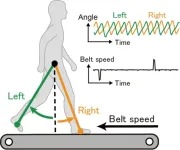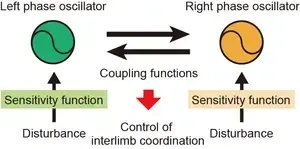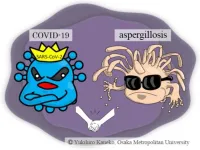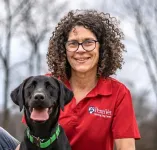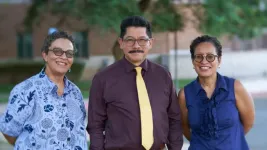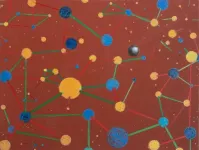(Press-News.org) Osaka, Japan – Walking is an activity that is often taken for granted. Most people usually think they can multitask by “walking and chewing gum” simultaneously with hardly any taxation of their mental effort. Indeed, each leg can move rhythmically independently of the other, controlled by its side of the spinal cord. However, the ability of the human brain to coordinate the gait so that a walker’s legs are half a stride out of phase with each other, called the “antiphase relationship,” is not so trivial when an obstacle or asymmetry occurs, such as a curve in the path. A better understanding of how a normal walking cadence is maintained may lead to enhanced rehabilitation techniques for patients who have experienced brain trauma or other neurological problems.
In a study recently published in Communications Biology, researchers from Osaka University captured kinematic data from healthy patients walking on a treadmill that was occasionally perturbed by a sudden change in speed. This led to a momentary loss of the antiphase relationship, but it was quickly restored as the subjects reoriented their walking movements. The data from this experiment was analyzed using a mathematical model of two coupled oscillators – similar to two pendulums connected by a spring – along with a Bayesian inference method. The approach allowed the researchers to calculate the most probable function that represents how the brain applied its control to coordinate the leg motions.
To simplify the problem further, phase reduction theory was applied, which assumes that the perturbed system is returning to a regular periodic solution, called the limit cycle. “Using Bayesian inference enabled us to infer the control of leg coordination in a quantitative way,” says lead author of the study, Takahiro Arai.
Surprisingly, the researchers found that the relative phase is not actively controlled by the brain until the deviation from correct the antiphase orientation exceeds a certain threshold. That is, the brain does not actively intervene to coordinate the relative position of the legs until they are a certain amount out of lockstep. They suggest that not requiring the constant application of control improves both energy efficiency and maneuverability.
“Based on our model, we see that the brain is neither overly controlling, which would limit our ability to negotiate obstacles and also consume a lot of brainpower, nor overly lax, which could lead to falling over when the legs become too uncoordinated,” says senior author, Shinya Aoi.
This research may be important to help improve the walking of elderly people, or individuals who have experienced the neurological effects of a stroke or Parkinson’s disease. It may also lead to the development of physical aids that help people walk more naturally.
###
The article, “Interlimb coordination is not strictly controlled during walking,” was published in Communications Biology at DOI: https://doi.org/10.1038/s42003-024-06843-w
About Osaka University
Osaka University was founded in 1931 as one of the seven imperial universities of Japan and is now one of Japan's leading comprehensive universities with a broad disciplinary spectrum. This strength is coupled with a singular drive for innovation that extends throughout the scientific process, from fundamental research to the creation of applied technology with positive economic impacts. Its commitment to innovation has been recognized in Japan and around the world. Now, Osaka University is leveraging its role as a Designated National University Corporation selected by the Ministry of Education, Culture, Sports, Science and Technology to contribute to innovation for human welfare, sustainable development of society, and social transformation.
Website: https://resou.osaka-u.ac.jp/en
END
Walking in lockstep
Researchers at Osaka University use experimental data and Bayesian inference to study the control of leg motion during walking, and find that intervention occurs only when discoordination exceeds a certain threshold, which may help improve rehab methods
2024-09-20
ELSE PRESS RELEASES FROM THIS DATE:
New blood test could be an early warning for child diabetes
2024-09-20
A new type of blood test using lipids could make it easier to identify children at risk of complications around obesity including type two diabetes, liver and heart disease, say scientists.
A new study from King’s College London published in Nature Medicine reveals a new relationship between lipids and diseases impacting metabolism in children, which could serve as an early warning system for conditions like liver disease.
Using machines that test blood plasma in babies that already exist in hospitals, the researchers suggest this ...
Oceanic life found to be thriving thanks to Saharan dust blown from thousands of kilometers away
2024-09-20
Iron is a micronutrient indispensable for life, enabling processes such as respiration, photosynthesis, and DNA synthesis. Iron availability is often a limiting resource in today’s oceans, which means that increasing the flow of iron into them can increase the amount of carbon fixed by phytoplankton, with consequences for the global climate.
Iron ends up in oceans and terrestrial ecosystems through rivers, melting glaciers, hydrothermal activity, and especially wind. But not all its chemical forms are ‘bioreactive’, that is, available for organisms ...
Analysis sheds light on COVID-19-associated disease in Japan
2024-09-20
As society learns to live with COVID-19, research on the disease and its complications remains important. Thus, an Osaka Metropolitan University team has pored through data to understand the incidence in Japan of COVID-19-associated pulmonary aspergillosis (CAPA), a severe invasive fungal infection of the lungs.
Few studies have been conducted on CAPA in Japan, but reports from overseas put the incidence between 3.8% and 35%.
Using Japanese administrative claims data, Graduate School of Medicine Lecturer Waki Imoto, graduate student Mr. Yasutaka Ihara, Professor Ayumi Shintani, ...
Cooler heads prevail: New research reveals best way to prevent dogs from overheating
2024-09-20
FOR MORE INFORMATION
Michael San Filippo
Senior Media Relations Manager
American Veterinary Medical Association
Cell/Text: 847-732-6194
msanfilippo@avma.org
Cooler heads prevail: New research reveals best way to prevent dogs from overheating
(SCHAUMBURG, Illinois) September 19, 2024— As temperatures continue to soar across the country, a simple yet innovative technique could be the key to keeping dogs safe from heat-related illnesses.
New research published in the Journal of the American Veterinary Medical Association (JAVMA) reveals that teaching dogs ...
UC Riverside medical school develops new curriculum to address substance use crisis
2024-09-20
RIVERSIDE, Calif. -- Nearly 6,000 opioid-related overdose deaths occurred in California in 2021, many due to fentanyl, a synthetic opioid. To address the crisis, a team of researchers in the School of Medicine, or SOM, at the University of California, Riverside, plans to develop and implement a curriculum that offers education on substance use disorders to medical students early and throughout their education.
To facilitate the development of the curriculum, the team has been awarded a grant of $900,000 from the Substance Abuse ...
Food fussiness a largely genetic trait from toddlerhood to adolescence
2024-09-19
Fussy eating is mainly influenced by genes and is a stable trait lasting from toddlerhood to early adolescence, finds a new study led by researchers from UCL (University College London), King’s College London and the University of Leeds.
The study, published in the Journal of Child Psychology & Psychiatry and funded by the UK mental health charity MQ Mental Health Research, compared survey results of parents with identical or non-identical twins in England and Wales from the ages of 16 months to 13 years.
The ...
Celebrating a century of scholarship: Isis examines the HSS at 100
2024-09-19
Isis: A Journal of the History of Science Society is widely recognized as a leading voice in the history of science. George Sarton founded the journal in 1912, and two years later the History of Science Society (HSS) was formed to advance the journal’s mission and centralize the nascent discipline. The September 2024 issue of Isis pays tribute to the centennial anniversary of the HSS with a collection of articles that delve into the rich history of the society and its publications.
In their introduction to the issue, editors Alexandra Hui and Matthew Lavine write that the issue can be seen as “a love letter of sorts: to the Isis readership, ...
Key biomarkers identified for predicting disability progression in multiple sclerosis
2024-09-19
A pioneering study presented today at ECTRIMS 2024 has identified critical biomarkers that can predict disability worsening in multiple sclerosis (MS). The breakthrough research has the potential to transform treatment strategies for millions of MS patients worldwide, paving the way for more personalised and effective treatment plans.1
In this multicentre observational study, conducted across 13 hospitals in Spain and Italy, Dr. Enric Monreal and his team found that elevated serum neurofilament light chain (sNfL) levels—a protein indicating nerve cell damage—at the onset of MS can predict both relapse-associated worsening (RAW) and progression independent ...
Study: AI could lead to inconsistent outcomes in home surveillance
2024-09-19
CAMBRIDGE, MA — A new study from researchers at MIT and Penn State University reveals that if large language models were to be used in home surveillance, they could recommend calling the police even when surveillance videos show no criminal activity.
In addition, the models the researchers studied were inconsistent in which videos they flagged for police intervention. For instance, a model might flag one video that shows a vehicle break-in but not flag another video that shows a similar activity. Models often disagreed with one another over whether to call the police ...
Study: Networks of Beliefs theory integrates internal & external dynamics
2024-09-19
The beliefs we hold develop from a complex dance between our internal and external lives. Our personal-level cognition and our relationships with others work in concert to shape our views of the world and influence how likely we are to update those views when we encounter new information. In the past, these two levels of belief have been studied largely in isolation: psychologists have modeled the individual-level cognitive processes while researchers in fields from computational social science to statistical physics have offered insights ...
LAST 30 PRESS RELEASES:
Visible light-driven deracemization of α-aryl ketones synergistically catalyzed by thiophenols and chiral phosphoric acid
Most AI bots lack basic safety disclosures, study finds
How competitive gaming on discord fosters social connections
CU Anschutz School of Medicine receives best ranking in NIH funding in 20 years
Mayo Clinic opens patient information office in Cayman Islands
Phonon lasers unlock ultrabroadband acoustic frequency combs
Babies with an increased likelihood of autism may struggle to settle into deep, restorative sleep, according to a new study from the University of East Anglia.
National Reactor Innovation Center opens Molten Salt Thermophysical Examination Capability at INL
International Progressive MS Alliance awards €6.9 million to three studies researching therapies to address common symptoms of progressive MS
Can your soil’s color predict its health?
Biochar nanomaterials could transform medicine, energy, and climate solutions
Turning waste into power: scientists convert discarded phone batteries and industrial lignin into high-performance sodium battery materials
PhD student maps mysterious upper atmosphere of Uranus for the first time
Idaho National Laboratory to accelerate nuclear energy deployment with NVIDIA AI through the Genesis Mission
Blood test could help guide treatment decisions in germ cell tumors
New ‘scimitar-crested’ Spinosaurus species discovered in the central Sahara
“Cyborg” pancreatic organoids can monitor the maturation of islet cells
Technique to extract concepts from AI models can help steer and monitor model outputs
Study clarifies the cancer genome in domestic cats
Crested Spinosaurus fossil was aquatic, but lived 1,000 kilometers from the Tethys Sea
MULTI-evolve: Rapid evolution of complex multi-mutant proteins
A new method to steer AI output uncovers vulnerabilities and potential improvements
Why some objects in space look like snowmen
Flickering glacial climate may have shaped early human evolution
First AHA/ACC acute pulmonary embolism guideline: prompt diagnosis and treatment are key
Could “cyborg” transplants replace pancreatic tissue damaged by diabetes?
Hearing a molecule’s solo performance
Justice after trauma? Race, red tape keep sexual assault victims from compensation
Columbia researchers awarded ARPA-H funding to speed diagnosis of lymphatic disorders
James R. Downing, MD, to step down as president and CEO of St. Jude Children’s Research Hospital in late 2026
[Press-News.org] Walking in lockstepResearchers at Osaka University use experimental data and Bayesian inference to study the control of leg motion during walking, and find that intervention occurs only when discoordination exceeds a certain threshold, which may help improve rehab methods
